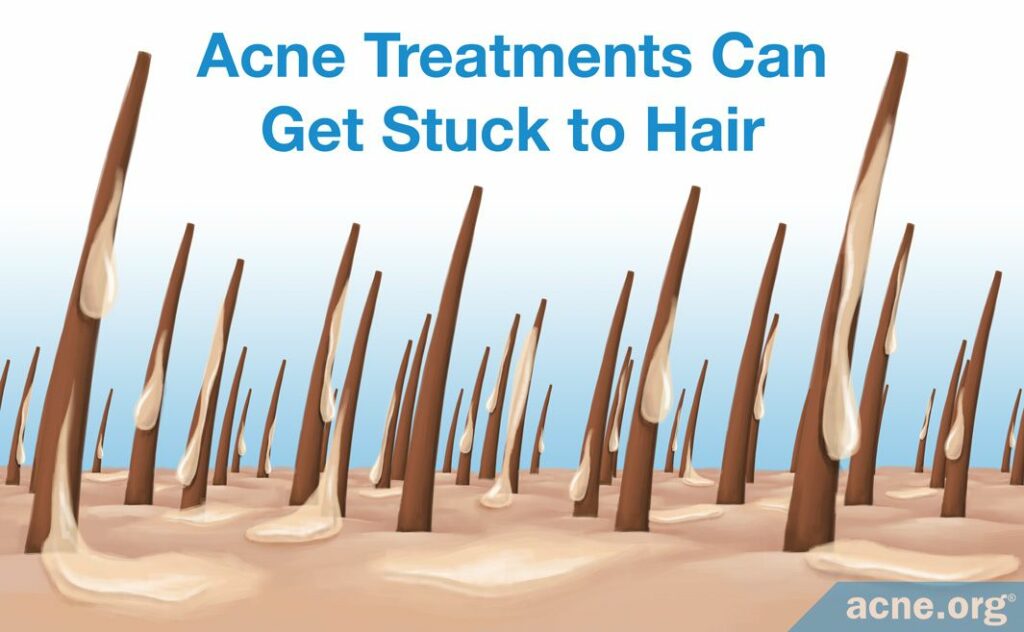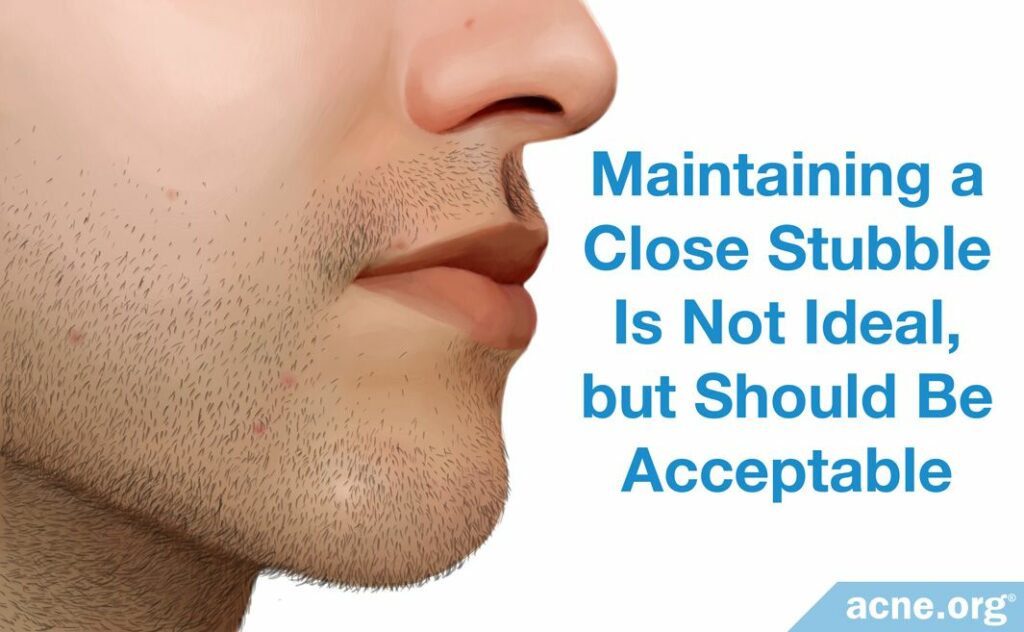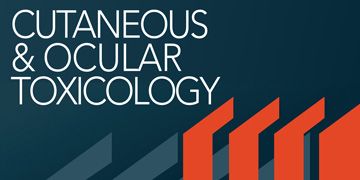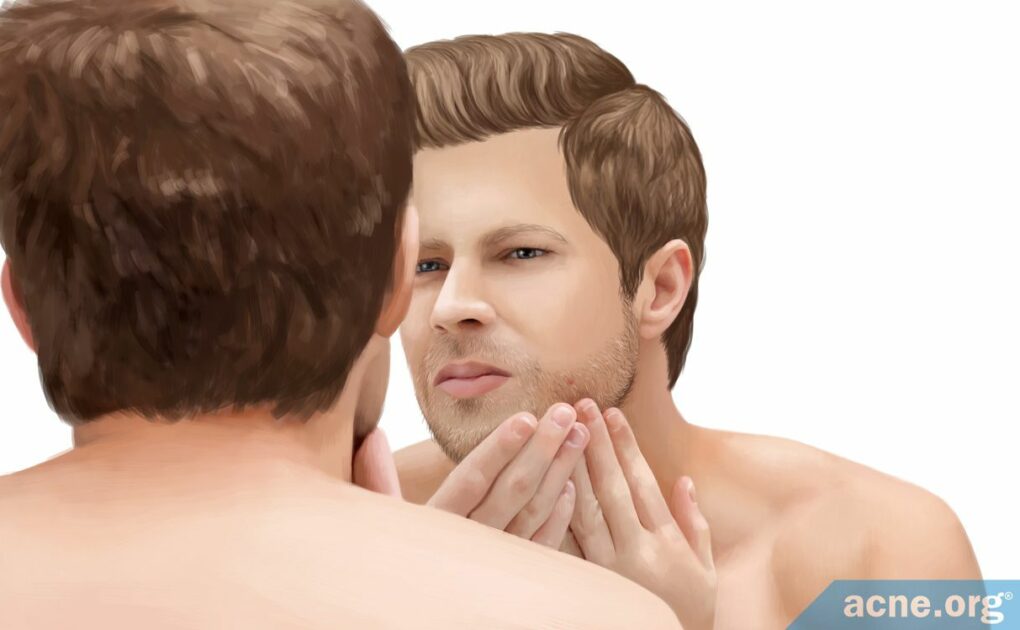The Shorter the Hair, the Better

The Essential Info
When you treat acne on the face with topical medications, the length of your facial hair matters–the shorter, the better. With a full beard or even a short beard, chances are that only a fraction of acne medication will reach the skin and get absorbed.
If you really love your facial hair and are determined to keep it, here are a couple helpful tips:
- Consider trimming it to a close stubble – approximately 1/10 of an inch or less. This will help more medication reach the skin.
- Apply more medication, taking extra time to smear it around. Since physical irritation of the skin can make acne worse, make sure to stay extremely gentle.

The Science
- A Beard May Reduce Absorption
- Maintaining a Close Stubble Is Not Ideal, but Should Be Acceptable
- What Do Studies Say Regarding Facial Hair and Absorption?
- The Bottom Line
A Beard May Reduce Absorption

Most topical medications, including acne treatments, are effective only when absorbed deep into the skin. To get absorbed, the medications have to contact the skin directly. If you wear a full beard or even a short beard, it may be difficult for the skin to absorb the drug because facial hair literally stands in its way.
Applying more medication should help, but depending on the length of your facial hair, even applying more medication may not be enough to achieve the absorption you need.
Remember: When applying medication, make sure you do this very gently because physical irritation can make acne worse.
Maintaining a Close Stubble Is Not Ideal, but Should Be Acceptable

A close stubble, approximately 1/10 of an inch or less, is a good alternative for people who need to treat acne on the face, but do not want to part with their facial hair completely.
To achieve this sort of stubble, trim your beard with a beard trimmer, which is designed specifically for keeping facial hair short without removing it completely.
What Do Studies Say Regarding Facial Hair and Absorption?
Researchers have looked into this question by comparing how well the skin absorbs substances when covered in hair and when shaved.
On balance, the research so far suggests that hair may impair the absorption of medications. Research also points toward shaving improving the absorption of medications, perhaps in the following two ways:
- Shaving removes hair: By removing hair, shaving clears the way for treatments to contact the skin directly, potentially increasing the chances of absorption.
- Shaving exfoliates: During shaving, a razor blade runs across the skin surface, removing some skin cells from the top layer of skin. This is known as exfoliation and might also improve absorption of substances into the skin.
Study 1 (strong evidence): The authors of a systematic review looked at research both on humans and on animals. They concluded that shaving does increase the absorption of some substances, but the increase in absorption depended on what was applied and on what animal it was applied.1 The study authors cautioned that more research is necessary.
Study 2 (weak evidence): The second study was performed on monkeys. In the study, the researchers applied the hormones testosterone and hydrocortisone to the inside of the monkeys’ forearms and observed how well the hormones get absorbed. In one group of monkeys, the inside forearm was shaved with an electric shaver, and in the other it was left unshaven. The researchers concluded that hair length did not matter for the absorption of hormones.2 However, this was only one animal study and may not translate to humans in any way.
Study 3 (weak evidence): The third study was performed on pig skin samples in the lab and tested how hair removal affected the absorption of several non-acne medications. Scientists consider pig skin to be a close approximation of human skin. The researchers found that various methods of hair removal improved the absorption of some medications, but again, this depended on the specific medication that the researchers applied.3
To sum up, the evidence seems to point to shaving helping with skin absorption, at least in humans. Conversely, this suggests that facial hair would get in the way of skin absorption.
Expand to read details of studies

A systematic review published in 2015 in the journal Cutaneous and Ocular Toxicology combed through 17 studies on shaving affects the ability of the skin to absorb substances. The researchers concluded that hair removal by shaving increases the penetration of some substances into the skin. However, the scientists noted that this depends on the specific substance and also on the species – in other words, hair removal might increase absorption in humans but not monkeys. For example, some studies found that in humans, shaving increased the absorption of antiperspirants and some dyes.1 However, this research does not tell us whether shaving facial hair also improves the absorption of topical acne medications.

In a 1975 study in Toxicology and Applied Pharmacology, the researchers applied testosterone and hydrocortisone to the inside forearm of the rhesus monkeys and tested how well the hormones were absorbed. In one group of monkeys, the inside forearm was shaven with an electric shaver, while in the comparison group the forearm was left unshaven. The study showed no difference in absorption of the hormones between the two groups.2
On the first glance, such results may seem to indicate that hair length does not matter, but this assumption is false.
First, as the researchers themselves note, the inside forearm of the rhesus monkey “is not very hairy,” which most likely means that the hair was short enough for the medication to directly contact the skin even on the unshaven forearm.
This study shows us that the hair did not interfere with topical absorption. However, animal studies do not always give us a clear insight into humans. How much hair did the monkeys have on their forearms in comparison to a human face, for instance? And is the skin of the monkey similar enough to human skin as far as how well it absorbs medication? These variables remain unknown. Therefore, the results of the study are inconclusive, and we need more research in this direction.

Finally, a study published in 2019 in the International Journal of Pharmaceutics tested how hair removal affected the absorption of several non-acne medications into pig skin samples in the lab. The researchers used pig skin because it is most similar to human skin compared to the skin of other animals like mice. The researchers found that hair removal by shaving, using a depilatory cream, electric epilation, or waxing did improve the absorption of some drugs. However, they noted that whether hair removal improved absorption depended on the chemical properties of the drug. In other words, we will not know for sure whether removing facial hair improves absorption of acne medications until researchers test this directly. The study authors wrote, “In conclusion, more comparative studies…on human skin are required to obtain further information.”3
The Bottom Line
If you are treating your acne with topical medication it is best to shave every day. However, if you want facial hair, consider trimming your beard to a close stubble. Then, when applying medication, apply more to make up for the medication that is bound to attach to hair and not absorb, and be sure to take extra time to smear it around so it can get absorbed. But remember, physical irritation can damage the skin and can lead to more acne, so stay very gentle.
References
- Hamza, M., Tohid, H. & Maibach H. Shaving effects on percutaneous penetration: clinical implications. Cutan Ocul Toxicol 34, 335 – 343 (2015). https://www.ncbi.nlm.nih.gov/pubmed/25363065
- Wester, R. C. & Maibach, H. I. Percutaneous absorption in the rhesus monkey compared to man. Toxicol Appl Pharmacol 32, 394 – 398 (1975). https://www.sciencedirect.com/science/article/pii/0041008X75902306
- Pany, A., Klang, V., Peinhopf, C., Zecevic, A., Ruthofer, J. & Valenta, C. Hair removal and bioavailability of chemicals: Effect of physicochemical properties of drugs and surfactants on skin permeation ex vivo. Int J Pharm 567, 118477 (2019). https://www.ncbi.nlm.nih.gov/pubmed/31255775
 Acne.org Products
Acne.org Products